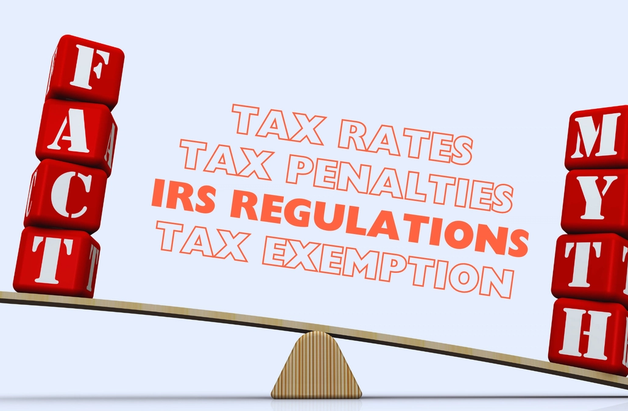13 Tax Myths Debunked: How to Identify False Tax Information

March 11, 2024
When the tax season arrives, it is crucial to ensure you follow the correct tax regulations applicable to your situation. Nowadays, it is easy to fall for tax myths and misleading tax information.
You must verify all information you encounter about tax filing or qualifying for certain tax deductions. Otherwise, you may end up facing penalties or being charged with tax fraud by mistake.
Fortunately, our tax experts are here to guide you in debunking the 13 most common tax myths and misconceptions.
Key Takeaways
- Debunking the different tax myths is crucial to filing your taxes and securely fulfilling any unpaid tax debt.
- Some of the most common tax myths claim that filing taxes is optional, students don’t have to pay taxes, and filing for a tax extension means more time to pay your taxes.
- The IRS consistently updates its existing tax regulations. Taxpayers can view and read more about these updates on the IRS’ official website.
13 Common Tax Myths
The most common tax myths involve filing taxes and qualifications for tax deductions or exemptions. Let’s expose these taxation myths one by one:
#1. Tax Myth: Students Don’t Have to File Taxes

Working students earning at least $14,600—the standard deduction for single filers—must file taxes. It is typical for people to buy into the tax myth that students don’t have to file taxes since not all students work or earn income.
Students who do work earn significantly less than employees with full-time jobs. It is worth noting that the IRS imposes taxes on everyone, student or not, as long as their income meets the minimum standard deduction tax rate.
There are also other reasons why students must still consider filing their taxes. One of these reasons involves possible qualification for specific tax credits, such as the American Opportunity Tax Credit or the Earned Income Tax Credit.
#2. Tax Myth: Filing Taxes is Optional
Contrary to what this tax myth claims, filing taxes is not optional. Many people argue that filing tax returns is an option because of the misconception that the U.S. tax system is voluntary. However, the use of the word voluntary does not refer to the act of paying or filing taxes.
It means that complying with the U.S. tax code and how they choose to file their taxes is voluntary. The IRS clearly states on its website that most U.S. citizens, including permanent U.S. workers, must file their returns.
At the same time, the federal government is not responsible for determining how much taxes each taxpayer owes. The taxpayers should calculate their taxes based on their income and filing status.
#3. Tax Myth: Gifts Are Considered Taxable Income
Not all gifts are considered taxable income. The IRS defines a gift as any direct or indirect monetary transfer to a person or individual without the expectation of receiving something of the same value or higher.
The IRS does not impose taxes on the following types of gifts:
- Gifts to spouses
- Gifts to qualifying charities
- Medical expenses or tuition paid for on behalf of someone else
- Gifts that are worth not more than $18,000 or the federal gift tax exemption for 2024
Gift tax applies to gifts from any estate or property. It also applies if you transfer or give someone income earned from the property without expecting to receive something of equal value in return.
#4. Tax Myth: Income From Cryptocurrency is Not Taxable

Cryptocurrency income is taxable because the IRS considers crypto a form of stock or asset.
Selling crypto in exchange for fiat money, paying for goods and services using bitcoin or any form of digital currency, or engaging in crypto-to-crypto trading can subject you to short or long-term gains taxation. Crypto taxes apply in these scenarios, requiring individuals to report their transactions accurately.
The tax rates for short-term capital gains can reach up to 37%, while long-term capital gains rates are capped at 20%. Meanwhile, losses incurred from selling or trading cryptocurrency are tax deductible.
NFTs (non-fungible tokens) are also taxable, and the IRS classifies them as property or income. Trading NFTs, disposing of NFTs to acquire fungible crypto, and creating NFTs for business purposes entail taxation from the government.
#5. Tax Myth: Filing for an Extension Means More Time to Fulfill Unpaid Taxes
Filing for a tax extension only grants you additional time to finalize and file your tax documents.
Several taxpayers fall for this tax myth, thinking they have time to pay their taxes. The longer it takes them to settle their taxes, the bigger the tax bill that awaits them.
Whether you still owe the IRS money or you failed to pay your taxes on time, you incur as much as 25% in penalties until you fully pay your unpaid taxes.
#6. Tax Myth: Tax Preparer is Liable For the Mistakes
Hiring a tax accountant or expert to prepare your taxes does not absolve you of any liability or responsibility in case your tax preparer makes a mistake or commits tax fraud.
Ultimately, your taxes and your identity as a taxpayer are on the line. Furthermore, signing your return after your tax preparer has finalized your tax paperwork means you accept responsibility for ensuring the accuracy of your tax return.
#7. Tax Myth: You Can’t File Taxes for Free
You don’t have to pay fees to file your taxes.
Even if you employ the services of a tax consultant or use software to prepare taxes, there are free filing service options that you can try, particularly if you don’t have a complicated tax return to file.
On the other hand, be wary of any suspicious individuals or groups offering to fulfill your paperwork for a hefty price.
#8. Tax Myth: Filing Taxes by Paper is the Safest Method

Filing taxes by paper is still accepted by the IRS, but it is susceptible to tampering and getting misplaced. The belief that paper filing is secure has gradually become a tax myth following the availability of various tax software.
The IRS recently introduced its e-filing system, the IRS Free File. The system aims to help taxpayers prepare and file their federal returns online.
With the help of trusted IRS partners offering guided tax preparation and filing software, you can easily file your returns and free-file fillable forms without breaking a sweat.
You can also take advantage of other secure online tools, such as Paystub.org’s W-2 form and 1099 form generator, that let you fulfill and submit your tax documents on time.
#9. Tax Myth: Home Office Deductions Applies If I Work From Home
Home office deductions do not apply to W-2 employees working remotely. Before the 2018 tax reform, employees working from home could claim home office deductions for unreimbursed work expenses.
The Tax Cuts & Jobs Act, signed by then-president Donald Trump and taking effect on January 1, 2018, repealed employee home office deductions. Self-employed individuals can claim unreimbursed business expenses, including home office costs.
Conversely, W-2 employees may still qualify for other tax loopholes, such as Child Tax Credit, Lifetime Learning Credit, or mortgage interest deductions.
#10. Tax Myth: I Don’t Need to File My Taxes If I Don’t Receive a W-2 or 1099-NEC
You must file your taxes even if you have yet to receive a W-2 form or 1099-NEC from your employer or client. Remember, you have to report the income you receive to the IRS regardless of whether you generate earnings as a regular employee or receive non-employee compensation.
Be careful not to fall for this tax myth because specific penalties await taxpayers who fail to file their W-2 forms. Not to mention, the IRS can detect a missing Form W-2 or 1099-NEC.
To avoid facing charges and severe penalties from the IRS, you can take advantage of the three-year window the IRS grants to individuals who cannot file their tax forms on time.
#11. Tax Myth: Flat Tax Rates Only Benefit the Wealthy

Flat tax rates can be beneficial for both wealthy and low-income households.
A flat tax rate is a single tax rate imposed on all taxpayers without consideration of their income or tax brackets. Unlike a progressive tax system, flat tax rates revoke taxpayers’ eligibility for tax exemptions and deductions.
The flat tax myth that claims the tax system only favors the rich is not entirely true. It all depends on how the flat tax rate system is imposed.
#12. Tax Myth: I Should Expect A Phone Call From The IRS If I Haven’t Paid My Taxes
The IRS will never contact taxpayers via phone to request immediate tax payments. They typically send a notice or mail to inform the taxpayer of unpaid tax dues or potential penalties if their tax debt remains unfulfilled.
The IRS may try to reach you via phone if you haven’t responded to their letter or notice.
Individuals who call taxpayers and claim to be IRS representatives are likely fraudsters using the most common IRS myths to extort money from unsuspecting individuals.
If someone calls you and asks you to pay your taxes through a wire transfer or a gift card, report them immediately.
#13. Tax Myth: Inheritance Tax Applies to All States in the U.S.

The federal government does not impose inheritance tax, and this debunks the inheritance tax myth that all U.S. states pay the said type of tax.
The inheritance tax applies to a select number of states across the country: New Jersey, Pennsylvania, Iowa, Kentucky, Nebraska, and Maryland. The tax rates levied on inherited assets also vary by state.
Final Thoughts
Differentiating between tax myths and tax facts is essential to ensuring you file your returns dutifully without incurring penalties or unsuspectingly committing tax fraud.
It is easy to fall victim to fake news peddlers and conspiracies if you do not know the right place to verify all the different types of tax updates and information you encounter.
When in doubt, the IRS's official website should be your go-to resource for all your tax inquiries. You can also check out some of our tax articles to understand the scope of your responsibility and rights as a taxpayer in the U.S.


